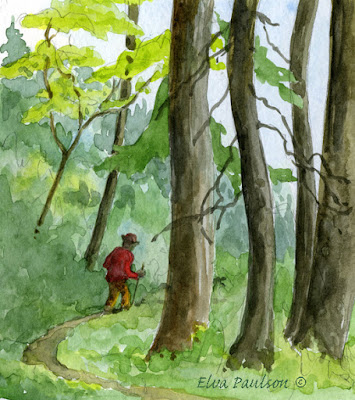 |
| Hinch Bridge, Sough Slough Reserve |
My last post was about sketching along the trails at South
Slough National Estuarine Reserve (on the Oregon coast). The reserve has a wonderful trail system
built on their 4800 acres and more than one path leading down to the
estuary. I almost expect a gnome to peer
at me from behind a moss covered log, or perhaps to find one sitting on top of
a mushroom. We seldom see a deer; and the only glimpse of a bear has been its poop,
but occasionally a band-tailed pigeon calls or I hear the stiff feathers of a
raven flying over.
While Dale, my husband, and I were walking, we chatted about what a
treat it is to be able to walk through the reserve’s coastal forest without having to fight the dense
undergrowth. The well-established trails
are pruned, and, when steep, the paths zigzag back and forth to provide a
sensible grade. Dale, during his long
career as a soil scientist for the U. S. Forest Service, often had to beat his
way through the forest when he was surveying soils. He commented these damp, Oregon slopes are
about as bad as it gets – worse than the many acres he mapped in Southeast
Alaska.
With those thoughts still lingering in our minds we stopped at
South Slough Reserve’s Visitor Center when we were done hiking. A tall, slim gentleman was arriving at the
same time. We paused and chatted and soon
were delighted to have met Don Cramer.
One of his many past jobs had been as a smoke jumper. Don had come to the center to drop off
brochures for the Siskiyou Smokejumper Base Museum four miles south of Cave
Junction, Oregon. He is among a handful
of smokejumpers who have brought life back to the smokejumper base that was
operational there from 1943 through 1981.
Their website is full of history but one item particularly caught my
eye: the base was established to help
combat Japan’s attempts to start forest fires in the American West during World
War II.
For more information about the Smokejumpers Museum be sure
and go to: www.siskiyousmokejumpermuseum.org. Better yet, go visit the museum. It is free and staffed by retired
smokejumpers.
While talking to Don we found he has had at least two other
unusual jobs during his long lifetime.
He worked on diesel submarines long enough to damage his hearing, and he
also worked as a consultant in a variety of far flung places including New
Guinea, Borneo …. and South Slough Reserve, only it wasn’t a reserve yet. Don agrees with Dale -- the heavily wooded slopes and dense
undergrowth found at Sough Slough are some of the toughest he has seen. Much of
the land was logged many years ago and has had time to generate thick, new
growth.
Don knows South Slough well.
In 1962 he worked as an independent contractor for a Portland, Oregon consulting
firm: Mason, Bruce and Girard. He spent
six months carefully surveying the patchwork of land Georgia Pacific was
preparing to transfer to what would become part of the reserve. It was not an easy job scrambling up and down
those dense slopes. His most unusual
find was a marijuana patch complete with a three story tree house. He also found where a cougar had recently
made a kill, and had occasional encounters with black bears. Mostly he found it was hard work getting the
land all sorted out.
Meeting Don was a reminder to me how young Oregon is in
terms of its history since Oregon became a state. Oregon became a territory in 1848 and the 33rd state in 1859. It was slightly over 100 years later that Don
was slogging through the dense new growth created by the early logging. He figures it had been logged about 70 years
before his survey.
I felt as though Dale and I were talking to piece of living history.




What a great encounter with the two-legged wildlife!
ReplyDeleteBet you made a new friend for life as you share so much close to nature.
Fascinating stuff here. Smokejumpers. Never heard of them. I think they are needed in CA right now. Wonderful art as usual. Story telling art too. I like that.
ReplyDeleteSo interesting, this history of young Oregon...It must be so nice to be so in sync with one another and with nature...
ReplyDeleteThis comment has been removed by a blog administrator.
ReplyDelete